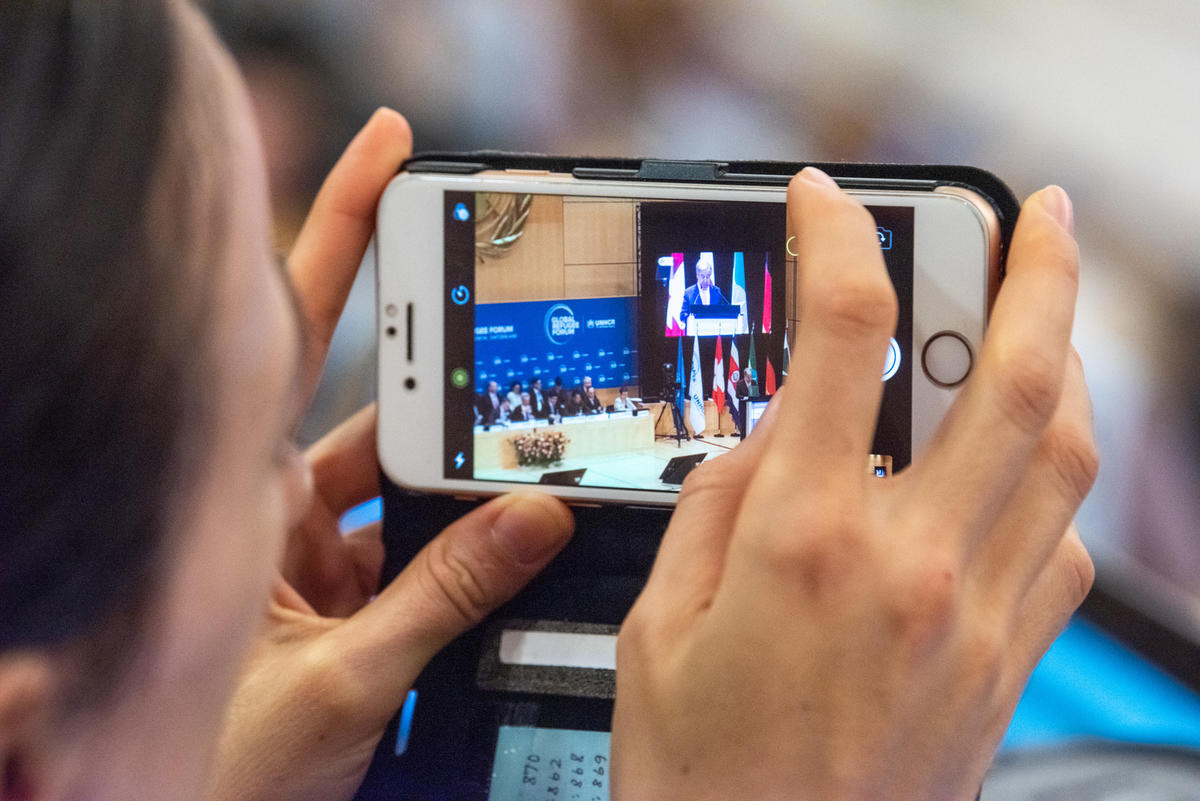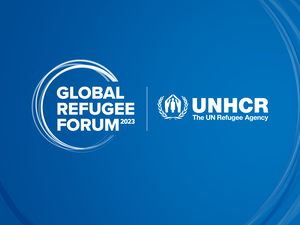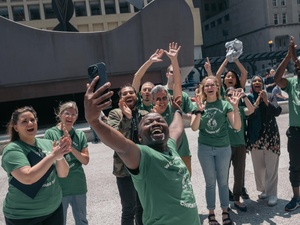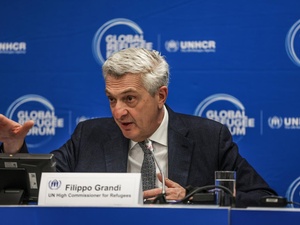International community must do more for world's refugees, says UN chief

International community must do more for world's refugees, says UN chief
The international community must do far more to share responsibility for millions of refugees worldwide through “bold and concrete” pledges, the UN Secretary-General today told a global gathering to transform the response to refugee situations at a time of record displacement.
“Gratitude is not enough at this time of turbulence … The international community must do far more to shoulder this responsibility together,” UN Secretary-General António Guterres told the opening session of the first-ever Global Refugee Forum.
“Now more than ever we need international cooperation and practical and effective responses … We need better answers for those who flee, and better help for communities and countries that host them.”
The Forum is meeting in Geneva at a moment when 70.8 million people are forcibly displaced worldwide, including 25.9 million refugees. Some 3,000 people are taking part, including refugees, heads of state and government, UN leaders, international institutions, development organizations, business leaders and civil society representatives, among others.
“Now more than ever we need international cooperation and practical and effective responses."
UNHCR, the UN Refugee Agency, is co-hosting the Forum together with Switzerland, and it is being co-convened by Costa Rica, Ethiopia, Germany, Pakistan, and Turkey – some of the countries hosting the largest refugee populations globally.
Over three days, it aims to generate new approaches and long-term commitments from a variety of actors to help refugees and the communities in which they live.
“I urge you to be bold and concrete in the pledges you’ll make,” Guterres, who served as UN High Commissioner for Refugees from 2005 to 2015, told the gathering. “This is a moment for ambition, it is a moment to jettison a model of support that too often left refugees for decades with their lives on hold.”
Opening the Forum on behalf of co-host Switzerland, Federal Counsellor Ignazio Cassis urged participants to exploit the synergies between the Global Compact on Refugees, the Global Sustainable Development Goals and the reform of the United Nations.
“It also means ensuring better coordination between the different actors in the achievement of lasting solutions,” he said.
Also addressing the Forum as co-host, UN High Commissioner for Refugees Filippo Grandi said poverty, inequality and the climate crisis are accelerating conflict and displacement, while “long-standing crises seem ever more intractable.”
At the same time, he said, a piecemeal and unbalanced approach to refugees means that countries with more resources push responsibility onto developing nations that are “less able to cope.”
“It’s time to reboot our responses,” Grandi said. “We need a sweeping vision, to inspire and engage people and institutions across society – a broad alliance of governments, the aid community, businesses, development institutions, civil society, faith groups, academia, sports and the arts, and refugees themselves,” he said. “We represent that very alliance – here, today”
“It’s time to reboot our responses ... We need a sweeping vision."
The Global Compact on Refugees, affirmed by the UN General Assembly a year ago, paves the way for all to take responsibility and play a role, Grandi said, including all levels of government, the private sector, development agencies and financial institutions, civil society, faith groups, and refugees themselves.
“Over the next two days, we can anticipate a vast array of innovative pledges and initiatives that will help transform the response to refugee crises into a truly global endeavour,” he said.
Following those speeches, the co-convening countries addressed the Forum.
Costa Rica puts human rights first in its approach to asylum-seekers and refugees, despite the strain they place on government finances, President Carlos Alvarado Quesada said. The country has received more than 70,000 asylum-seekers from Nicaragua since last year in addition to many others from the region.
“Our public health system … is always free for under age persons, pregnant women and people in emergency situations. Now with the support of (UNHCR) we will add to that providing medical insurance throughout the country to all the asylum-seekers and their families for one year,” he said.
“We are praying that the peace process succeeds so that the people of Afghanistan ... can enjoy the dividends."
Pakistan hosts more than 1.4 million Afghan refugees and Prime Minister Imran Khan said he hoped for peace in Afghanistan.
“We are praying that the peace process succeeds so that the people of Afghanistan who have been suffering for 40 years they too can enjoy the dividends,” he said.
Ethiopia’s Deputy Prime Minister Demeke Mekonnen announced new measures to support the country’s refugees and host communities. These include 90,000 socio-economic opportunities through agricultural and livestock value chains and quality and accredited skills training for 20,000 hosts and refugees.
“The government of Ethiopia has a commitment to deepen inclusive policies towards refugees,” he said. The country hosts around 700,000 refugees and asylum-seekers.
Germany is the only industrialized country in the top 10 states to host refugees, Foreign Minister Heiko Maas said. It is the second biggest donor and the fifth largest host for refugees.
Germany will increase its resettlement places next year. This year it has more than doubled its unearmarked contributions to UNHCR and in 2020 it will maintain support at a similar level with a first tranche of 124 million euros, Maas said.
“The message that should emerge from this global conference is that we wish to see greater solidarity in our approach to refugees,” Maas said.
Turkish President Recep Tayyip Erdogan called for greater support for his country and for others that host refugees in great numbers. Turkey hosts nearly 3.7 million Syrians.
"I hope and pray that this Forum will be instrumental in ... tackling the refugee crisis ... once and for all. "
“In this day and age, our fates are sealed and our destinies are common,” said Erdogan. “And I hope and pray that this Forum will be instrumental in terms of tackling the refugee crisis from a humanitarian point of view once and for all."
He added: “The Global Refugee Forum should help us extend a helping hand to all of the victims around the world who have been ... inspired by our gathering here this morning. We should provide them hope for the future.”
Grandi used the platform to welcome some 80 refugees to the Forum, stressing their “pivotal role” in shaping its outcomes.
Among them was Aya Abdullah, uprooted from her home in Baghdad, Iraq at age 14, who is now a university student in Switzerland.
“Refugees are people who are by their nature peaceful,” Abdullah said. “Believe in us. Invest in us and you will see – we will all be stronger for it."
A raft of contributions at the Forum include financial, technical, and material assistance; legal and policy changes to enable greater inclusion of refugees in society; resettlement places, and support to countries of origin to build an environment conducive to solutions.
Discussions, special events and high-level dialogues in Geneva will focus on six key areas: arrangements for burden and responsibility sharing; education; jobs and livelihoods; energy and infrastructure; solutions; and protection capacity.
The Forum will also examine how humanitarian and development responses can complement one another.
For a complete list of pledges at the Global Refugee Forum, see the dashboard.
- See also: Live blog: Global Refugee Forum – Day 2

















